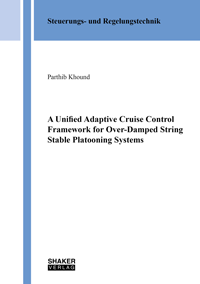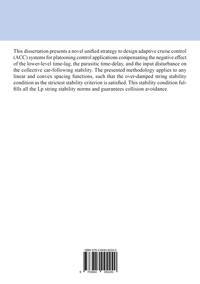
Shop : Details
Shop
Details
45,80 €ISBN 978-3-8440-9224-0Softcover170 pages53 figures221 g21 x 14,8 cmEnglishThesis
September 2023
Parthib Khound
A Unified Adaptive Cruise Control Framework for Over-Damped String Stable Platooning Systems
This dissertation presents a novel unified strategy to design adaptive cruise control (ACC) systems for platooning control applications compensating the negative effect of the lower-level time-lag, the parasitic time-delay, and the input disturbance on the collective car-following stability. The presented methodology applies to any linear and convex spacing functions, such that the strictest stability criterion is satisfied, i.e., the over-damped string stability condition. Indeed, the over-damped string stability criterion is a key feature for safety and comfort for any platooning systems. This condition also prevents oscillation, overshooting, and undershooting collective dynamics. Additionally, this criterion fulfills all the Lp string stability norms and guarantees collision avoidance.
Keywords: adaptive cruise control; string stability; over-damped string stability; time-lag compensation; time-delay compensation; disturbance compensation
Export of bibliographic data
Shaker Verlag GmbH
Am Langen Graben 15a
52353 Düren
Germany
Am Langen Graben 15a
52353 Düren
Germany
Mon. - Thurs. 8:00 a.m. to 4:00 p.m.
Fri. 8:00 a.m. to 3:00 p.m.
Fri. 8:00 a.m. to 3:00 p.m.
Contact us. We will be happy to help you.



